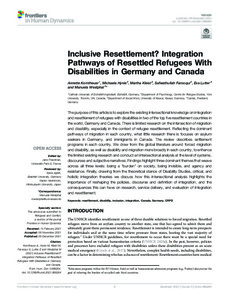| dc.date.accessioned | 2022-05-06T06:05:44Z | |
| dc.date.available | 2022-05-06T06:05:44Z | |
| dc.date.issued | 2021-12-09 | |
| dc.identifier | doi:10.17170/kobra-202205066140 | |
| dc.identifier.uri | http://hdl.handle.net/123456789/13814 | |
| dc.description.sponsorship | Gefördert durch den Publikationsfonds der Universität Kassel | |
| dc.language.iso | eng | |
| dc.rights | Namensnennung 4.0 International | * |
| dc.rights.uri | http://creativecommons.org/licenses/by/4.0/ | * |
| dc.subject | resettlement | eng |
| dc.subject | disability | eng |
| dc.subject | inclusion | eng |
| dc.subject | integration | eng |
| dc.subject | Canada | eng |
| dc.subject | Germany | eng |
| dc.subject | CRPD | eng |
| dc.subject.ddc | 300 | |
| dc.title | Inclusive Resettlement? Integration Pathways of Resettled Refugees With Disabilities in Germany and Canada | eng |
| dc.type | Aufsatz | |
| dcterms.abstract | The purpose of this article is to explore the existing intersectional knowledge on integration and resettlement of refugees with disabilities in two of the top five resettlement countries in the world, Germany and Canada. There is limited research on the intersection of migration and disability, especially in the context of refugee resettlement. Reflecting the dominant pathways of migration in each country, what little research there is focuses on asylum seekers in Germany, and immigrants in Canada. The review describes settlement programs in each country. We draw from the global literature around forced migration and disability, as well as disability and migration more broadly in each country, to enhance the limited existing research and conduct an intersectional analysis at the level of systems, discourses and subjective narratives. Findings highlight three dominant themes that weave across all three levels: being a “burden” on society, being invisible, and agency and resistance. Finally, drawing from the theoretical stance of Disability Studies, critical, and holistic integration theories we discuss how this intersectional analysis highlights the importance of reshaping the policies, discourse and definition of integration, and the consequences this can have on research, service delivery, and evaluation of integration and resettlement. | eng |
| dcterms.accessRights | open access | |
| dcterms.creator | Korntheuer, Annette | |
| dcterms.creator | Hynie, Michaela | |
| dcterms.creator | Kleist, Martha | |
| dcterms.creator | Farooqui, Safwathullah | |
| dcterms.creator | Lutter, Eva | |
| dcterms.creator | Westphal, Manuela | |
| dc.relation.doi | doi:10.3389/fhumd.2021.668264 | |
| dc.subject.swd | Deutschland | ger |
| dc.subject.swd | Kanada | ger |
| dc.subject.swd | Flüchtling | ger |
| dc.subject.swd | Umsiedlung | ger |
| dc.subject.swd | Behinderung | ger |
| dc.subject.swd | Inklusion <Soziologie> | ger |
| dc.type.version | publishedVersion | |
| dcterms.source.identifier | eissn:2673-2776 | |
| dcterms.source.journal | Frontiers in human dynamics | eng |
| dcterms.source.volume | Volume 3 | |
| kup.iskup | false | |
| dcterms.source.articlenumber | Article 668264 | |


